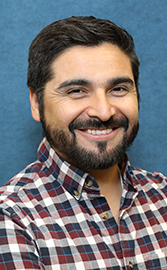
-
Felipe Aburto Guerrero
- Assistant Professor
Pedology and Soil Biogeochemistry - Office:
- Heep Center 544 - 545
- Email:
- [email protected]
- Phone:
- 979-321-5920
- Resume/CV
- Graduate Education
- M.S. Soil and Biogeochemistry, University of California - Davis, 2011
- Ph.D, Soil and Biogeochemistry, University of California - Davis, 2014
- Courses Taught
- SCSC 310 - Soil Morphology and Interpretations
- SCSC 489 - Soil Judging
- SCSC 605 - Pedology
Areas of Expertise
- Pedology
- Soil Biogeochemistry
Professional Summary
Felipe Aburto, Ph.D. is an assistant professor in the Department of Soil and Crop Sciences. Aburto explores landscape-scale processes, human-soil interactions, and biogeochemical controls on soil mineral weathering, elemental cycling, and soil development. He also emphasizes pedological mechanisms and soil functions that support vital ecosystem services, including carbon sequestration, nutrient and water cycling, and interactions among soils, microbes, vegetation, and hydrology at different scales.
Aburto’s research program, studies the underpinning pedological mechanisms that control soil formation, such as mineral weathering and secondary mineral formation and biogeochemical supporting processes that define ecosystem productivity and resilience. He believes an enhanced understanding of these mechanisms in natural and managed environments will allow the prediction of temporal, horizontal, and vertical distribution and changes of soil properties and functions and derived services at the landscape scale.
Aburto’s previous research looked at soil development and weathering patterns in different environmental settings using traditional chronosequences and climosequences approaches. He also studied the effect of human disturbances, including agriculture and forest use intensification, grazing, fire, erosion, etc., on intrinsic soil properties linked to soil functions. He also directs and collaborates in applied research projects that look at the rate and state of recovery of inherent soil properties (e.g., mineralogy), microbial and fauna diversity and C and nutrient cycling after restoration or reforestation with native vegetation.
Students: Alejandro Atenas | Svani Campos | Jonathan Kerman | Deepa Khadka